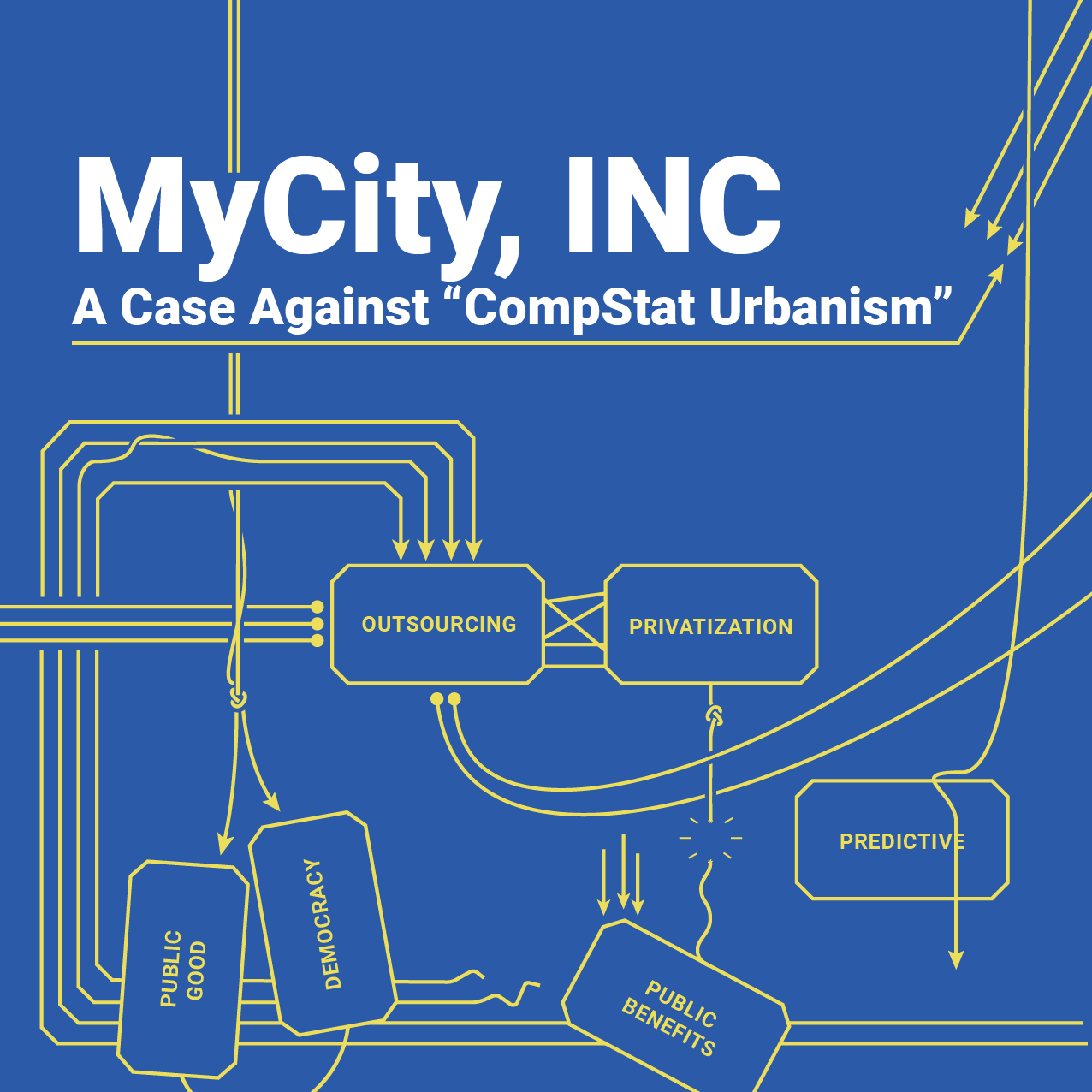Predictive technologies in public infrastructure expand the power of policing
Welcome to Surveillance Resistance Monthly, the Lab’s monthly newsletter that focuses on challenging the technologies that fuel state and corporate power. Alongside others, we seek to strengthen our collective analysis of these technologies of violence and control. We also aim to build, nurture and accumulate the power of organizing and resistance—locally and transnationally— against these technologies.
Subscribe here, follow us on social media [on IG or X], or head to our website to learn more.
INTRODUCTION TO THIS ISSUE
Globally, techno-utopian fantasies about the ‘smart city’ are being used to justify the digital transformation of local government infrastructure. This issue of Surveillance Resistance Monthly explores how tech corporations, in the context of austerity budgets, are privatizing and digitizing infrastructures, including social services, transportation, communications, housing, logistics, and more. Digital solutions to local governance challenges, such as digital IDs, mobile driver’s licenses, digital wallets, electronic benefit systems, and centralized agency databases, often have concealed carceral consequences [i.e. leading to policing, punishment or imprisonment]. As described by in the authors of essay Corporate Tech and the Legible City [in Resisting Borders and Technologies of Violence]:
“As tech giants reimagine the city for us, the city contorts to the divide between the wealthy and the working class: a frictionless urban interface for the wealthy [the smart city and other privatized digital services], and for the others, a system of control, criminalization, and extraction.” .
— Ryan Gerety, Mariah Montgomery, Mizue Aizeki, and Nasma Ahmed
Surveillance Resistance Lab focuses on the government procurement of technologies that expand surveillance, deepen corporate power, and weaken democracy, not just in the US, but around the world. We look at sites where technology is shifting the balance of power between communities, corporations, and the state—such as schools, workplaces, hospitals and public spaces.
We hope you enjoyed this issue! If you have feedback or resources to share, please do get in touch.
In solidarity,
The Surveillance Resistance Lab team
WHAT’S ON AT THE LAB?
RECENT PUBLICATIONS & EVENTS

MyCity, INC: A Case Against ‘CompStat Urbanism’ — Mayor Adams explained that MyCity will “[combine] all agency metrics onto a single platform similar to CompStat and [use] analytics to track performance in real time, we can go from a reactive management approach to being proactive and, eventually, predictive.” This report centers concerns about the potential for MyCity to expand policing and embed corporate entanglements into digital public infrastructure.
The report collects cautionary tales from other cities that relied on “AI governance”—outlining examples of automated denials to benefits, AI-generated accusations of fraud, and other technologies that pushed people out of social safety nets and into handcuffs. Ultimately, it demonstrates that the use of predictive analytics in city governance can reinforce inequality and unequal power relations.
Resisting Borders and Technologies of Violence [book launch recording] — This new anthology offers analyses on how carceral border regimes are increasing racialized surveillance, control, and violence at borders, cities, and beyond. It also includes case studies on how people are fighting back against “smart” borders, digital IDs, “smart city” technologies, and more. On February 15, 2024 at 2.00pm – 3.30pm, Ruha Benjamin hosted the international book launch. It was a powerful conversation with editors Mizue Aizeki [Founder and Executive Director of the Lab], Matt Mahmoudi, and Coline Schupfer, as well as contributors Ruth Wilson Gilmore, Marwa Fatafta, and J. Carlos Lara Gálvez. The in-person New York City event is coming up on Tuesday 21 May [details to come]. Order a copy of the book.
Opinion: Illinois lawmakers are fooling themselves about license plate reader surveillance by Ed Vogel [Senior Policy Research at the Lab] - This op-ed published in the Chicago Tribune regarding the inadequate attempts that Illinois elected officials have taken in protecting abortion seekers and undocumented people while rapidly expanding the state's surveillance apparatus via corporately-owned automated license plate readers.
GET INVOLVED
[EVENT] Digital Identity and Domination: The Major, NYPD, and MyCity platform — On March 27 at 7pm, the Surveillance Resistance Lab and Law and Political Economy NYC will present a conversation about New York City’s “MyCity” initiative. The event will be hosted by Mizue Aizeki. Panelists include Raúl Carrillo [Columbia Law School] and Vincent Southerland [NYU Law School] and Cynthia Conti-Cook [Director of Research & Policy, Surveillance Resistance Lab]. Join us at NYU Law School’s Furman Hall, Room 910 [register here].
Virtual space for organizers resisting surveillance tools — Dozens of states are quietly but quickly adopting Mobile Drivers Licenses [mDLs] programs, a Department of Homeland Security facilitated identification infrastructure which holds the potential to exacerbate the surveillance all of people especially those seeking abortions, those subject to racially discriminatory and gender-based policing, immigrants, and others. The Lab is hosting a monthly virtual space for local organizers and community members interested in building local campaigns resisting the adoption of these surveillance tools. In January, the Lab hosted a webinar on mobile driver's licenses with the National Immigration Law Center and in March, presented to the National Association of Criminal Defense Lawyer’s Public Defender Tech Training program. If you are interested in joining the monthly organizing space, please contact Ed at ed[at]surveillanceresistancelab.org.
‘FUTURE CITY’ INSPIRED READING / LISTENING / VIEWING
Big Tech corporations, nation-states, and universities [particularly computer science departments] have for decades promoted visions of the future “smart city” where ubiquitous digital technologies drive economic growth, fix all injustices, and make urban governance efficient. In more recent years, well-established critiques of “smart cities” as a form of securitisation, surveillance, and smart control have emerged, and yet, the techno-utopian fantasies continue to persist. Here we have collected some books, articles and art that challenge these visions and in some instances offer alternatives of the future city:
- The City is Not a Computer — This book by Shannon Mattern examines how urban technologies and computational models profoundly limit how we engage with cities. City dashboards aggregate data for the purposes of divining the future, and shaping policies and practices to bring a desired world into being. However, stories of failed city dashboards from around the world reveal that we can’t know our cities through a screen.
- Artist Chitra Ganesh’s representation of cities from “Sultana’s Dream” — In 1905 Bengali Muslim feminist and activist Rokeya Sakhawat Hossain feminist utopian short story “Sultana’s Dream” that posits a world [LadyLand] where women use scientific prowess to eradicate disease, end war nonviolently and restore health and beauty to the world. In a 2018 installation, artist Chitra Ganesh, created a series of linocuts representing the story, including the piece below titled ‘City in Broad Daylight’.
- Case Study of Fighting San Diego’s Smart Streetlights Super Surveillance System [book chapter] — In Chapter 35 of Resisting Borders and Technologies of Violence, Khalid Alexander and Lilly Irani from Transparent and Responsible Use of Surveillance Technology [TRUST] Coalition describe how thirty community groups came together to fight against surveillance technologies, including smart cities projects such as smart streetlights [public light fixtures that incorporate remote sensing technologies such as cameras].
- The Smart City of Gaza Technologies of Containment and the Urban Condition — This 2020 PhD thesis by Francesco Sebregondi offers a counter-intuitive proposition. Sebregondi argues that the brutally devastated Gaza Strip, whilst a stark contrast to the branded image of the “smart city”, reveals one of the lesser known purposes of smart urbanism: to efficiently contain populations considered both surplus and threat.
- What’s Public about India’s Digital Public Infrastructures? - this article by Eshani Vaidya for Bot Populi analyzes the privatization of critical public services such as welfare delivery, healthcare, and education in India. It looks at the impact of digital initiatives such as Aadhaar, the Unified Payments Interface [UPI], and the Unified Health Interface [UHI].
